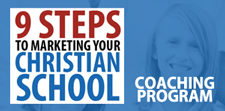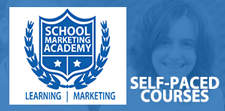
In the continuing pursuit of on-demand content for school administrators, admissions professionals and marketing and communication directors for private schools, we launch the next episode the school marketing podcast. In this episode, I share ideas on differentiation – a very broad topic.
In order to break it down, I share ideas on how schools need to understand their target market when communicating the appropriate differentiators.
Something this summer, we hope to have this podcast officially into iTunes – until then, please click on the “+” sign below to play the 28-minute episode.
SCHOOL MARKETING: Randy Vaughn – Differentation: Showcasing Your School’s Uniqueness to the Right People
See below or click here for more PODCAST episodes

School is back in full swing! Your to-do lists are piling up and there is a great buzz on campus of a variety of different activities, not counting all the academic work!
Independent/private Christian schools need to think more about differentiation. This is what will set you apart in the marketplace. This will help you distinguish your school from other private nonsectarian schools as well as the public, charter and home school options around you.
Here are 7 activities that most schools do in the fall and an idea or two of how to optimize these activities in marketing your Christian school:
- Homecoming – because I live in Texas, Homecoming is always going to be in the fall although some schools I’ve worked with do it in conjunction with a winter or spring sport if they do not have football. At your Christian school, consider how Homecoming is different than at the public schools. While in Texas we have the crazy tradition of Homecoming mums (here’s an extreme example), your school may choose to do something in lieu of mums (traditional Texas mums can cost hundreds of dollars, which some students may choose to donate to a charity instead). Also, because your school likely smaller than your public school counterpart, you can recognize alumni differently, have alumni prayer gatherings before the Friday night game, and so much more. Homecoming can be a special event, but ask yourself: how different is what we do than our public schools around us? Carrying over some traditions is fun (HOCO dress-up days) but if you do not do anything unique, it might be worth looking at your annual traditions differently. Differentiation is critical to marketing.
- Grandparents Day – many elementary school across the country host a day for grandparents to come and visit the classroom and share a meal with their grandkids at their school. Again, if you’re school is smaller, perhaps you can do a special musical program or a performance by all of the students in elementary. Certainly you could involve your grandparents in a time of worship and prayer since you are not restricted by that like your public school colleagues are.
- Athletics – Cross Country, Volleyball, and Football are the most common fall sports, although your school may have others. How does your school differentiate itself at these sporting events? Do you pray before or after the game? Do you learn to integrate Scripture into your training of your athletes? Do you treat athletic training in the broader context of discipleship? How do you communicate striving for excellence but also enjoying the love of God? One school I worked with many years ago had an idea to launch a video series called, “The Making of a Kingdom Athlete.” They were already talking about spinning off a blog series and using the combination of written word and video to create vignettes to share with future families. The way you treat athletics should be noticeably different than the public schools.
- Fine Arts – whether it’s band on Friday night or some of the upcoming holiday performances (Veterans Day, Thanksgiving and Christmas), Fine Arts is a beautiful way to showcase your students’ talent. While you may lament that the size of Fine Arts program/facilities/equipment, how can you use your size to an advantage? Often at the large pubic school performances, there are limited solos. But at a smaller school, you can have more. While you still want to feature excellence, think of the different ways you can showcase individual talent. Your larger competitors simply cannot do that. This is an easy way to stand out.
- Annual Fund – most public schools do not have to have Annual Funds because they are funded by government sources. However at most privately-funded schools, the Annual Fund is a tool to bridge the gap between tuition revenue and the actual costs of school operations. The Annual Fund is a fundraising event, but it can be a great way to highlight the community aspect of your school. While outsiders may view it as a purely fundraising event, you can gather people together to pray for God to provide for the gap that exists. It also gives you plenty of opportunity to talk about some of the things your school is wanting to have in areas of facilities, technology, and safety. It provides a great platform to talk about the important things while future families listen in!
- Assessment – every school tests students, but it’s the government-mandated standardized testing that causes angst in parents and their kids. Often accused of “teaching to the test”, your private school does not have to abide by the same government standards (this is why it can be a great marketing tool for you). However, you can certainly talk about how you use benchmarks to assess your students’ academic progress (here’s how Eastern Christian talks about the difference). Parents do not like curriculum that is driven solely by a standardized test, however they want an excellent academic preparatory program. Use this differentiator to showcase you strong your academics are.
- Holidays – with Halloween, Veterans Day, Thanksgiving, and Christmas, your schedules are full of holidays. Many Christian schools avoid Halloween (many public schools do as well), but you can showcase how you still have fun with various dress up days. Veterans Day is a great way for you to gather Veteran parents and grandparents for a celebration on your campus or you may want to ask to have your middle school or high school choir sing for veterans at a community-wide celebration. Because of the spiritual nature of Thanksgiving and Christmas (and how such spiritual connotation has been virtually removed from the public square), you should make sure and showcase your performances that talk about how you are “grateful to God” or in the context of celebrating the birth of Jesus.
This article is not meant to list out a thousand innovations – the point is to recognize that it is the way that your school treats the common factors is how future families will tell there is something different about you. Look for ways to take the commonly-shared experiences the public schools have and turn them into great marks of differentiation. Also, use this as a test to determine if you are any different than your competing private schools in the area. If you cannot find much difference, how do you expect a future mom or dad to find you unique?
I love helping schools create plans and strategize about reaching future families. If I can help you, please click here to schedule a 30-minute free phone consultation to learn about my coaching program specifically designed for Christian schools.

Randy Vaughn, Christian School Marketing Consultant
One of the most common areas of enrollment marketing and retention strategy is to focus on the ever-important transition years. As you look to retain students, keeping them on through the transition years is an important strategy to have in place.

TIPS ON TRANSITION YEAR MARKETING:
PRESCHOOL to KINDERGARTEN
- REALITY: Parents will often take advantage of tax deductions for preschools, so private schools are viable options. However, as parents face Kindergarten, many assume that they will move back to a free public school option.
- RETENTION STRATEGY: Your Kindergarten teachers are the key to a preschool mom keeping her babies at your school. Every mom and dad is concerned about who will take care of their babies once they hit the Kinder age. Make sure your Kindergarten teachers are front-and-center at preschool pickup. Have your Kindergarten teachers provide videos about issues related to reading readiness, behavioral/parenting tips, and general discussion of the things that make a positive Kinder experience (mom will love your brief videos on their smart phones). Have fun, too, so create some parodies, some humorous routines on parenting strong-willed boys, and make them laugh and cry!
KINDERGARTEN to ELEMENTARY
- REALITY: In many suburban areas, the challenge for private elementary schools is that the nearby public elementary schools are really pretty good. Pastors are reluctant to promote a Christian elementary school because his pews are filled with good-hearted public school teachers. Because there are so many loving men and women who pour out their passion on teaching young kids, public elementary schools in your neighborhood are hard to beat on price (free!) Parents are definitely more involved at the lower school ages, too, so moms and dads are heavily invested in their school.
- RETENTION STRATEGY: Differentiation is critical at this stage. When you are competing against FREE public schools, you have to do the hard work of identifying the key elements that make you unique compared to the free options, like public or charter schools. Also, focus as well on what makes you stand out from your private school competitors. If you are not absolutely clear on your uniqueness, create something! Especially parents who have not experienced the public school option may assume that the choices between schools is really only based on price . . . and that is a lousy place to compete. Educate them on why staying from Kindergarten on into Elementary would be a better choice than going anywhere else!
ELEMENTARY to MIDDLE SCHOOL
- REALITY: These are some of the most difficult transition years. First, on a positive note, you may be able to pick up some new students who find their public middle school (or homeschool middle school) unacceptable or unrealistic. They may be receptive to a new option where the class size would be smaller which often provides more accountability and a safer place for kids. Parents and students alike find this attractive. If it didn’t make you seem desperate, I would encourage you to stand out front of the nearby middle school on opening day with a sign that reads, “If you are sitting in the car right until the bell rings because this place scares you, then stop by for a tour of our school where kids and parents feel safe and secure!” 🙂 The other reality, is that this is a year where you may lose some of your bright elementary kids because of finances or access. First, money is an important factor. Some parents will begin to think about college or even the current cost of living with multiple kids. Secondly, some moms and dads idealize the other private school or public school with better technologies, nicer facilities, and a whole lot more potential friends for their kids.
- RETENTION STRATEGY: The teachers are key in this transition. Blow out of the water the notion that middle school teachers are heartless compared to elementary schoolteachers. Showcase regularly your middle school math teacher, the volleyball coach and the middle school principal to the parents and students in 2nd, 3rd, 4th and 5th grade. Do not wait until the latter year to rely on a “field trip” to the Middle School building to secure the deal. Secure the transition by having your students and parents fall in love with the personnel who will continue to care for their kids during the awkward preteen years. Talk about how you will help them academically, emotionally, physically and spiritually (if appropriate) in ways that a government-funded institution cannot. 6th and 7th graders should regularly mentor and befriend students in 4th and 5th grade so that students will have Middle School peers to look up to and to follow guide them through the transition. Have your Middle School boys basketball coach volunteer to lead dodge ball once a month for all 5th graders so they develop a special relationship with him. Your MS choir teacher can be the judge for the fun solo competition in 4th and 5th grade choir – have the MS teacher offer loving tips on improving vocal performance. It is all about getting the personnel into the line of sight and into the heart of students and their parents as far back as 3rd and 4th grade, not to mention 5th.
MIDDLE SCHOOL to HIGH SCHOOL
- REALITY: Some parents may pull out at 9th grade because they begin to calculate the cost of college. As well, some families begin to think about what “college preparatory” is really all about and think they want a more “real world” experience to prepare their child for post-secondary life.
- RETENTION STRATEGY: Information is important at this point, but even more so is inspiration! You will need to provide testimonies of parents who have stayed through high school and brag on the holistic preparation their child receives. You should easily be able to produce graphics and infographics that showcase the amount of merit-based scholarships your seniors have received over the past 5 years. Have alumni speak video and audio testimonies about how your school prepared them for college, both academically and in the other “real world” areas of life. Offer unique education for seniors about managing personal finances, time management, and how to discover their gifts and passions for their lives. This added value for seniors and their families will be invaluable and will make you stand out with parents when they even begin to explore other options.
For more information about RETENTION, sign up for our premium course:


In Texas, the STAAR (also referred commonly as the mandated standardized test – although the “test” seems redundant since the first “A” is for “assessment”) is the Spring standardized test administered to students of the Texas public school system (at various grade levels, there are different schedules). I am in Texas so it is the talk of the state about this time every year. Even McDonald’s offers free food to students taking the STAAR!

While the exam is mandated, the mandated standardized test has widespread disapproval by students, parents and even teachers (read what one Christian school teacher says about “teaching to the test”). Yes, there are those who approve and feel the necessity of it. But as a private school, you should target those dissatisfied public school families. These are families who are frustrated that the fun has been taken out of learning, that the anxiety level for their 3rd grader is too high, or convinced that their child is too young to wrestle with text anxiety.
Caveat #1: just because a family is unhappy in their public or homes school environment does not make them your “ideal family” – I do not wish to equate the two. Your ideal family is the type of family that can become a “loyal ambassador” who embodies the values of your school AND repeats and refers with great joy. In marketing, you are hoping to target your ideal family who is frustrated with their current educational choice.
Caveat #2: your school may administer standardized tests, or least be preparing your students for the college preparatory standardized tests such as the SAT or ACT. You do not wish to convey a false sense that “we do not believe in standardized testing” because this could set you up for disillusioned parents later.
Here are 3 key considerations when marketing to your ideal family’s needs, pains, problems, frustrations and fears:
- Provide, Don’t Pounce – yes, it is easy to prey on the frustrations of public school families and wag your private school finger at (more…)














